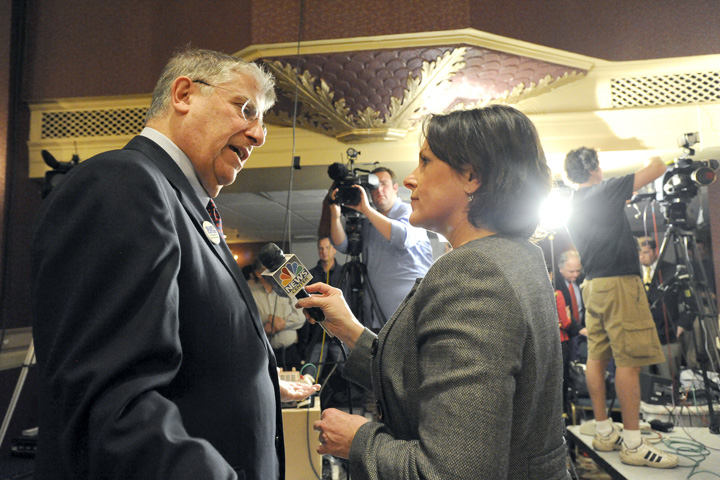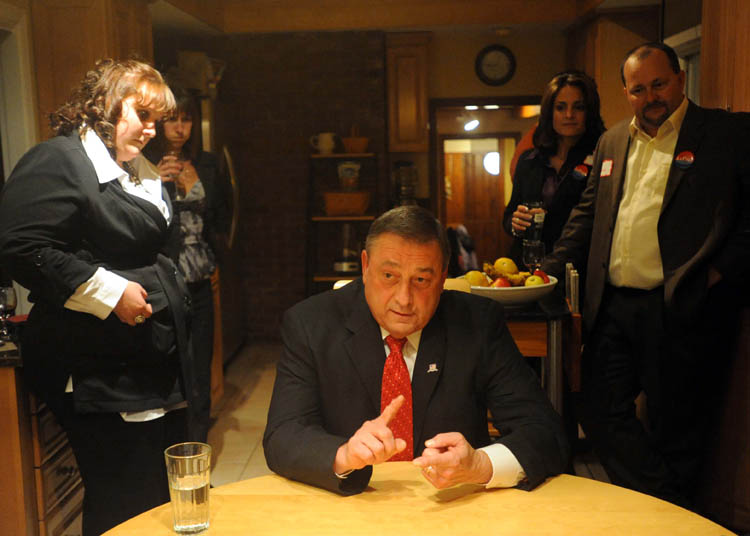Republican Paul LePage and independent Eliot Cutler were locked in a two-way race for Governor late Tuesday.
With 20 percent of precincts reporting at 10:30 p.m., Cutler had 39 percent of the votes and LePage had 32 percent.
Democrat Libby Mitchell conceded the race early, at 10 p.m., after early results gave her about 22 percent of the vote.
“I will be supportive of the next governor, whoever that is,” she told more than 100 supporters at Bayside Bowl with her family gathered behind her on stage.
In a six-minute address, Mitchell thanked her family, her staff and all the supporters who made signs and phone calls on her behalf.
“We worked on our principles. We stood up for justice. We fought for our school teachers. We stood up for children,” she said.
While Cutler was leading LePage comfortably in early returns, the numbers are expected to tighten as more smaller towns report results.
However, the poor results for Mitchell clearly boded well for Cutler, who was drawing Democratic voters and undecided voters in the final days and weeks of the campaign.
“One of the parties has to collapse for the independent to win,” said Kenneth Palmer, professer emeritus at the University of Maine. In 1974 when Independent Jim Longley won in the final days of the campaign, it was the Republican candidate who collapsed.
“This year, should Cutler hold his lead, you’d have to say its the democratic campaign” that collapsed, Palmer said.
LePage, the 62-year-old conservative mayor of Waterville, has been the clear frontrunner since his runaway victory in the Republican primary in June. A blunt critic of big government and big spending, LePage was widely expected to ride the national pro-Republican wave into the Blaine House.
Dan Demerrit, LePage’s spokesman, said around 10 p.m. that the campaign was relying on late-arriving results from the smaller towns where Lepage has strong support.
“We’re feeling good it’s a race and we’re not unopposed,” he said.
For LePage, winning election as governor would be the culmination of a remarkable life story.
He grew in Lewiston’s “Little Canada,” the second oldest of 18 children and left his family at age 11 after receiving a beating from his alcoholic father. He later went to college and got a masters degree in business and is now general manager of Marden’s Surplus and Salvage.
As the Republican mayor of Waterville he has earned a reputation for cutting spending.
LePage tapped into the national groundswell of voter frustration with big government, taxes and debt, promising to cut spending and reform entitlement such as welfare. He had strong support from Maine’s Tea Party groups.
LePage’s temper and rhetoric got him in some hot water during the campaign. He told voters he as governor he would tell President Obama to “go to hell” and he blew up at reporter’s questions about homestead tax exemptions on his family’s homes in Maine and Florida. But the dip in his poll numbers was small, and temporary, and he never lost the lead.
“I think he is ornery enough to do something,” said Albert Ingraham, a 61-year-old Republican and vending company owner in South Portland. “He has a good reputation in Waterville. I want change.”
Richard Downs, a 65-year-old retired Democrat in Portland, agreed.
“I think a change is what we need,” he said. “I think he’s going to bring some jobs to our state. We need them.”
Cutler drew cheers from his supporters at the Eastland Park Hotel in Portland at abut 10 p.m. when he announced he had won Bangor, his hometown and a key city in the race.
The 64-year-old lawyer from Cape Elizabeth had consistently run third in the polls behind LePage and Mitchell for most of the long campaign. But his campaign surged in the past two weeks after winning newspaper endorsements across the state and after Democrats came to see him as the candidate most likely to challenge LePage.
“I feel great, I feel hopeful, I feel reasonably confident. But I have been through a lot of these before, and I know it’s still early,” Cutler said.
Cutler worked for U.S. Sen. Edmund Muskie, D-Maine, helping to write the landmark Clean Air and Clean Water Acts. After a stint as a budget manager in the Carter Administration, he had a long law career. In recent years, he led a law office in China, a connection that led to some of the campaign’s most controversial ads.
One Democratic mailing had Chinese characters on the front and, on the back, said: “”With Eliot Cutler as governor, Mainers might as well learn Chinese.”
Some now believe the ads backfired.
On the campaign trail, Democratic voters repeatedly told Cutler they had switched their votes to him because of the mailers.
Former Gov. Angus King, also an independent, also cited the mailers as the reason he decided to endorse King on Saturday. King’s backing, though late in the campaign, was seen a big boost to Cutler’s chances.
“He had an idea of what he intends to do – a game plan, whether good or bad,” said Kevin Heenan, a 33-year-old sous chef in Portland.
“As opposed to someone who is enthusiastic and throws their hat in – like the Tea Party guy. He (LePage) is getting people riled up, but has not thought about the issues.”
“I think he is a thoughtful person, ” said Karen Lewis, a 69-year-old Democrat who voted for Cutler in South Portland. “I think he’s a person who can cut some ice.”
But many voters clearly cast strategic votes for Cutler.
“I think I would have voted for (Mitchell), but from what I’ve read, the polls I’ve seen, Libby Mitchell was declining so much,” said Gretchen Fleming, a 39-year-old teacher from Norway. “It was a hard decision. I didn’t really love any of them. But I really do not want Paul LePage to win.”
Mitchell remained competitive heading into the final days, but clearly struggled as a long-time legislator in an election year when voters demanded change.
“She’s the best for all people,” 62-year-old Frank Gironda said after voting for Mitchell in Portland. “She has a lot of experience. She is surely intelligent. And I think it’s time to give ladies a chance.”
Her defeat represents the likely end of a long and historic political career in Maine.
A resident of Vassalboro, Mitchell was first elected to the Maine Legislature in 1974. In 1996, she became the first woman elected by her peers to serve as Speaker of the House of Representatives. In 2008, she became the first woman in the country to be chosen as both House Speaker and President of the Senate, Maine’s second-highest political office.
“It’s a very distinguished career,” said L. Sandy Maisel, political scientists at Colby College. The defeat Tuesday “is not a reflection of her. She was a the wrong candidate at the wrong time.”
Independents Shawn Moody and Kevin Scott became household names but never reached double-digits in the polls.
Secretary of State Matthew Dunlap warned late Tuesday that it might take time to declare a winner.
Forty percent of Maine’s ballots are hand-counted, so a close gubernatorial race might not be decided until early Wednesday. A really close race might take even longer to sort out, he said.
Send questions/comments to the editors.



